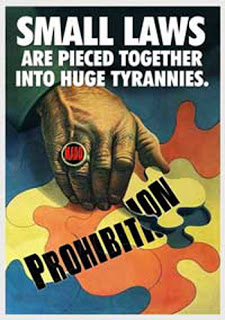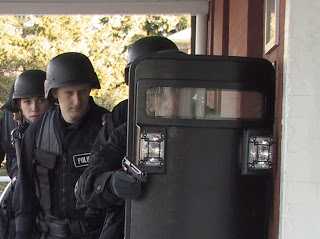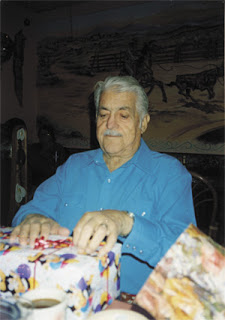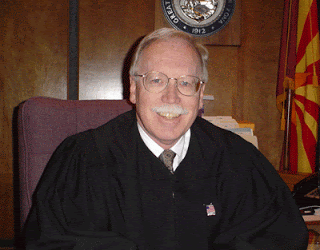Private Vices, Public Crimes

Vices are those acts by which a man harms himself or his property.
Crimes are those acts by which one man harms the person or property of another.
Vices are simply the errors which a man makes in his search after his own happiness. Unlike crimes, they imply no malice toward others, and no interference with their persons or property.
In vices, the very essence of crime – that is, the design to injure the person or property of another – is wanting. It is a maxim of the law that there can be no crime without criminal intent; that is, without the intent to invade the person or property of another….
Unless this clear distinction between vices and crimes be made and recognized by the laws, there can be on earth no such thing as individual right, liberty, or property…. For a government to declare a vice to be a crime, and to punish it as such, is an attempt to falsify the very nature of things. It is as absurd as it would be to declare truth to be a falsehood, or falsehood truth.
Lysander Spooner, Vices Are Not Crimes: A Vindication Of Moral Liberty
Six months ago, an unjustified SWAT raid on the Scottsdale, Arizona home of Salvador and Carlota Celaya resulted in a fire that deprived the elderly couple of all their earthly possessions.
This was a crime, not a vice.
The police obtained a search warrant claiming they had evidence connecting the Carlota family and its home to Erasmo Ruiz Villarreal, who was wanted for a home invasion robbery a few nights earlier. At the beginning of the raid, SWAT operators threw a flash-bang device – a grenade that carries a potentially lethal charge, and has incendiary effects – into a bedroom. The grenade is marked with a warning that it is not to be “deployed” on flammable objects, such as bedding. So it’s not surprising that the bed caught on fire.
The purpose of using a “diversionary” grenade is to “disorient” the target. In this case, the target – the criminal suspect – wasn’t on the premises. Salvador Celaya, a 73-year-old man who suffers from Alzheimer’s disease, was already quite disoriented by the raid: Not knowing that the armed assailants were police, he armed himself with a .22 revolver and began shooting.
One would think that the heroes of the SWAT team – swaddled in protective armor, bearing ballistic shields, and packing very large caliber weapons – would be able to withstand such a withering barrage from a small-caliber weapon and be able to subdue a confused 73-year-old man without killing him or destroying his home.
One would think so. One would be wrong.
According to the police report, it was Salvador, not the SWAT team, who was responsible for the fire that gutted his home. The police insisted that Salvador’s “decision to arm himself with a gun forced them to implement safety precautions that prevented them from putting the fire out.”
This is a standard element of every SWAT raid: Officer safety uber alles. But the fire wouldn’t have ignited if the police had followed correct “safety precautions” before the grenade had been flung into the bedroom.
The Celayas immigrated to the United States 45 years ago; he worked as a mechanic, she labored as a seamstress. Through frugal living they acquired enough money to buy the home that was destroyed in the raid – an event for which the police department accepts no responsibility.
“This is not a botched raid,” sniffed Gilbert P.D. Spokesdrone Lt. Joe Ruet as the debris was still smoldering. “It’s not the wrong house, and it’s a very serious criminal that we’re after.”
Well, that “very serious criminal” wasn’t there, and neither were any of the stolen items – including $7,000 in cash, consumer electronics, a pit bull, and rims from a Cadillac Escalade, at least some of which would have survived a fire – that were listed on the search warrant. So it was the “wrong house,” and an innocent couple was deprived of their home for nothing. Wouldn’t this fit the description of a “botched raid”?
Well … no. The Gilbert Police Department, after long and detailed scrutiny, has exonerated itself completely (wasn’t the suspense terrific?). Although the Gilbert PD admitted that the SWAT operators “did not adequately announce their entry” into the Celaya home, this was only a “minor violation” of department policy.
As I noted earlier: This was a crime – an immensely destructive act of negligence that deprived an elderly couple of the product of their lifetime labors. By refusing to accept its moral responsibility to the Celayas, the Gilbert PD has compounded culpable negligence with active malice. The Celayas are preparing to sue the city for $750,000, which most likely means that the local taxpayers – rather than the guilty officials – will pay for the crime committed against that family.
Meanwhile, elsewhere in Arizona, another elderly individual – 83-year-old Phil Cisneros – faces a life sentence in prison as a result of a personal vice that shouldn’t be punished as a crime.
For at least part of his time in the State Prison in Florence, Cisneros was sleeping outdoors in 100-degree heat. He suffers from “prostate cancer, diabetes, pulmonary hypertension, sleep apnea, shingles, dizziness, and shortness of breath,” reports the Phoenix New Times. Most of those afflictions can kill him. Unless action is taken to commute his three-year sentence, Cisneros will die in prison. In fact, the State may quietly accelerate that process, given that it will cost at least $65,000 to provide Cisneros with medical care for each year he’s imprisoned. And he has committed no crimes against persons or property.
A few weeks ago, he was sentenced to three years in prison on a felony DUI conviction handed down in absentia nine years ago.
In 1993, Cisneros lost his first wife Lucy to Alzheimer’s disease. The stress of caring for his invalid wife apparently drove him to the bottle. Between 1989 and 1992, he was busted for DUIs four times. After Lucy died, Cisneros sobered up. He met another wonderful woman also named Lucy and remarried, much to the delight of his five children and fifteen grandchildren.
And then both he and his second Lucy were diagnosed with cancer. This apparently drove him back to driking, and in 1998 he was arrested for rolling through a stop sign on his way home from a bar. A canny DUI lawyer could likely have worked out a deal that didn’t involve time behind bars, but Cisneros never showed up for the trial. Gila County Prosecutor Daisy Flores, whose surname should be “Nettles” rather than “Flowers,” insists that Cisneros made a conscious attempt to avoid punishment.
However, according to everyone who knows him, Cisneros has made no effort to hide himself from the police, who for their part made no effort to bring him in. Furthermore, Phil has let Lucy do all the driving. She was behind the wheel a few months ago when the couple was returning from a dental appointment in Mexico. Border Guards detained the couple and arrested Phil on the nine-year-old conviction.
According to Flores, her office has actually exercised clemency by “forgiving” one of Cisneros’s prior convictions and imprisoning him for merely three years – which is to say, for life: “[H]e took off for eight and a half years. I don’t feel any pity for him.”
Los Angeles County Prosecutor Rocky Delgadillo, Paris Hilton’s Inspector Javert, has provided a useful and timely reminder that the most inflexible prosecutors tend to be the most cavalier about obeying the laws. With that in mind, someone should rummage around in Daisy Flores’s background and find out what un-addressed infractions and petty crimes litter the record of that pitiless little shrike.
Gila County Judge Robert Duber has displayed a similar gift for compassion and proportionality: During the trial, confronted with letters from 65 friends and relatives urging leniency, the Judge sneered that he saw 65 “co-conspirators” who had concealed Cisneros rather than clicking their heels and surrendering him to the State.
Duber’s reaction when told that Cisneros suffers from several terminal afflictions displays a similar human touch: “The entire jail system is full of people who have very bad health problems.”
Like Phil Cisneros, my father is 83 years old, and like myself he doesn’t drink, smoke, or engage in any similar vices (although both of us have a weakness for soda, which is a much bigger health risk than, say, smoking marijuana, something I neither do nor recommend).
To Robert Duber II, I offer this observation just by way of useful advice:
If some preening, overfed, tax-devouring chair-polluter who wears a dress to work sent my elderly father to die in prison for a non-violent offense, I would be severely tempted to track that “judge” down and curb-stomp his ugly, arrogant face. Permanent disfigurement would be a condign punishment for a judicial crime of that sort.
Yes, I believe in the non-aggression principle. But the death sentence Duber inflicted on Phil Cisneros was an act of aggression against someone whose behavior – once the key distinctions are understood – was a vice, not a crime.
“But isn’t driving while intoxicated a crime?” I hear someone asking – most likely my Past Self, who believed as much until quite recently. My thinking on the subject has changed, in large measure because of these wise insights offered by Thomas Fleming:
“We have to give up such pernicious folly as the delusion that in locking up a DUI offender we are protecting the public…. Just as the state does not exist to make people virtuous, the criminal justice system does not exist to protect the public but to punish criminals once they have committed a crime…. [T]o punish a DUI offender who has not harmed anyone is to punish a physical or moral condition. Adultery in the heart may be as sinful as one carried out, but we punish the act and not the state of mind…. These blood-alcohol crimes are the equivalent of thought-crimes.”
The language of Orwell’s dystopia is appropriate to a discussion of Arizona’s demented DUI law, under which some offenders must install an Orwellian ignition interlock system that forces them to take a breath test as a condition of operating a vehicle.
The assumption here is that people who occasionally become intoxicated on alcohol cannot be trusted to operate their own cars – just as it’s supposedly just to deprive Phil Cisneros of what little time he has left to enjoy the company of his grandchildren and terminally ill wife because of a nine-year-old DUI conviction.
And meanwhile, power-intoxicated Judges who needlessly tear long-suffering families asunder, and SWAT operators who leave innocent elderly people homeless and destitute, are free to visit such misery on others.
Such is the state of affairs in the state that gave us Barry Goldwater.
Please be sure to check out The Right Source.
Content retrieved from: http://freedominourtime.blogspot.com/2007/06/private-vices-public-crimes.html.






